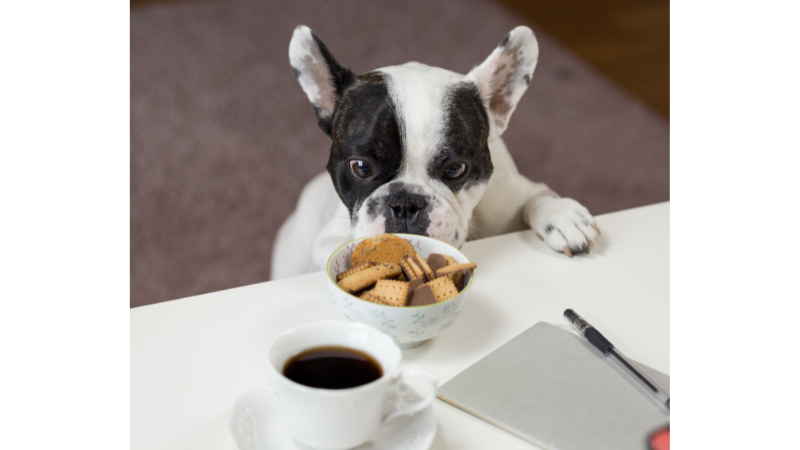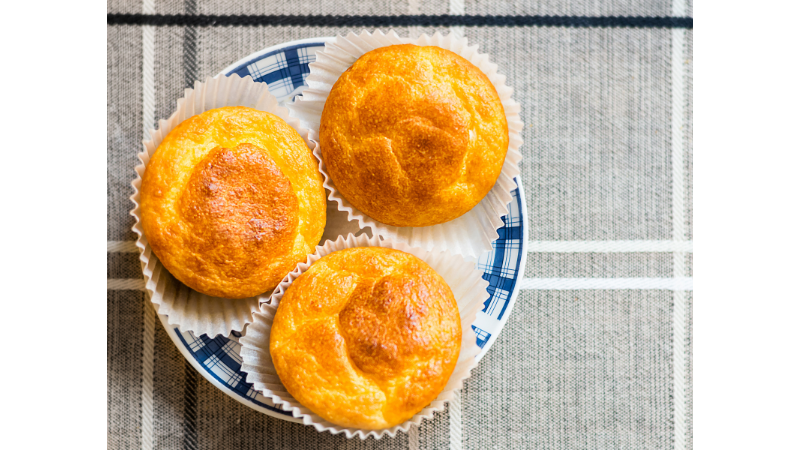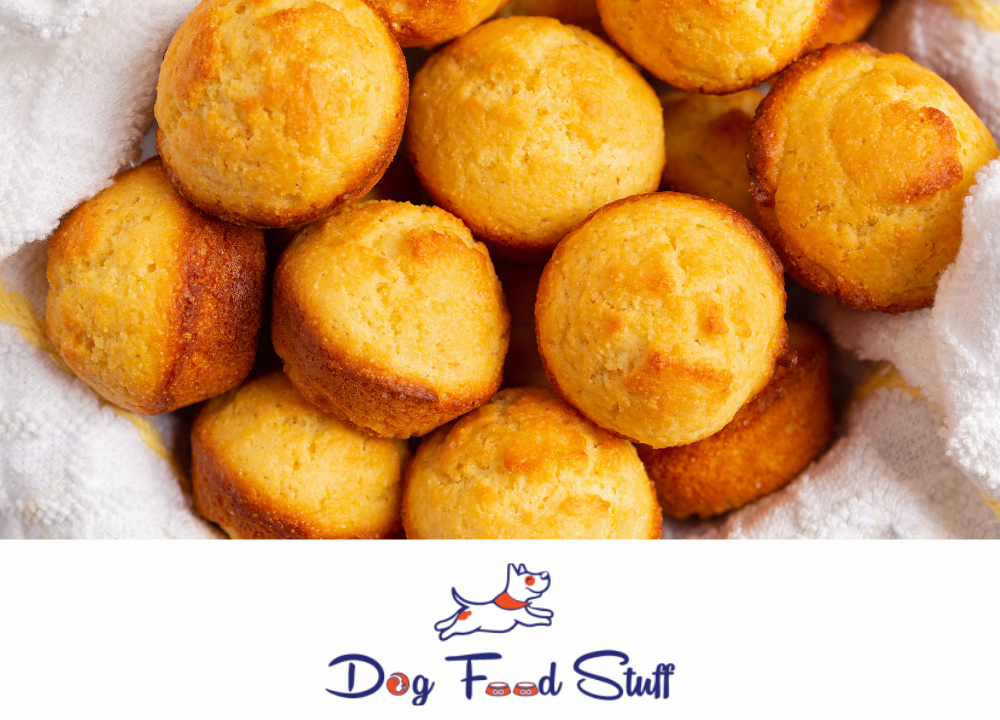Benefit or Harm? Let’s Find Out Can Dogs Eat Corn Muffins
Dogs can eat corn muffins in moderation, but they aren’t the healthiest choice. Frequent consumption may lead to health issues due to sugar and preservative content.
Pet owners often wonder about the safety of sharing human snacks with their canine companions. Corn muffins might seem like a harmless treat, especially since dogs can safely consume plain corn in small amounts. However, typical corn muffins from bakeries or store shelves usually contain additional ingredients that are not ideal for dogs.
These ingredients may include high levels of sugar, sodium, and potentially harmful preservatives and additives that can negatively impact a dog’s health over time. It is crucial for dog owners to prioritize treats made specifically for dogs, which consider the nutritional needs and limitations of their diet. Feeding dogs human foods, especially those high in sugar and fats like corn muffins, should be a rare occurrence to avoid potential health complications, such as obesity and diabetes.
Nutritional Value Of Corn Muffins
Corn muffins are a popular snack or breakfast option for many. As pet owners seek human-food treats for their dogs, it is essential to consider the nutritional aspects of corn muffins. Understanding what nutrients they provide helps assess whether they fit into a dog’s diet. Let’s dive into the specifics.
Calories
Corn muffins are calorie-dense. A single muffin may contain around 200 to 300 calories, depending on size and recipe. Considering a dog’s limited daily calorie needs, offering a whole muffin could risk weight gain. Moderation is key.
Carbohydrates
The primary ingredient in corn muffins is cornmeal, a notable source of carbohydrates. Carbs provide energy, but excessive amounts can lead to obesity in dogs. A small piece of corn muffin may suffice.
Protein
Protein levels in corn muffins are moderate. While dogs require protein, it is usually obtained from meat-based sources rather than grains. Thus, corn muffins do not significantly contribute to a dog’s protein needs.
Fat
Corn muffins often contain oil or butter, adding to their fat content. High fat intake can result in pancreatic and digestive issues in dogs. Notice the fat content and serve sparingly.

Vitamins And Minerals
Corn provides some B vitamins and minerals like phosphorus and magnesium. However, the amounts in corn muffins may not be noteworthy. Dogs derive most vitamins and minerals from their regular, balanced diet.
| Nutrient | Contribution to Diet |
|---|---|
| Calories | High; monitor portion size |
| Carbohydrates | Main ingredient; provides energy |
| Protein | Moderate; not a key source for dogs |
| Fat | Present; can cause health issues |
| Vitamins and Minerals | Some B vitamins and minerals present |
In summary, corn muffins carry caloric and nutritional weight. But they should be offered in small amounts to avoid health complications. Dog owners must consider their furry friend’s overall diet before introducing human treats like corn muffins.
Feeding Corn Muffins To Dogs
Oh, those golden-brown corn muffins look tempting on the kitchen counter, don’t they? But before sharing with your furry friend, let’s look at whether dogs can safely enjoy corn muffins. Keep your pet’s health top priority as we explore the impact of this common snack.
Digestion Issues
Dogs digest differently than humans. Corn muffins might cause them tummy troubles. Dogs can find it hard to digest the corn and wheat flour in muffins. Simple ingredients can lead to upset stomachs or more serious digestion problems.
Obesity Risks
The sugar and fat in corn muffins are not ideal for dogs. A regular diet including such treats can lead to weight gain or obesity. Obesity in dogs increases risks for diabetes, joint problems, and heart disease.
Allergies And Sensitivities
It is vital to know your dog’s allergies. Some dogs show adverse reactions to grains or other muffin ingredients. Look out for signs of allergies like itching or gastrointestinal upset.
Dogs And Corn Allergy
Can dogs eat corn muffins? This is a common question for dog owners. Some dogs can safely enjoy corn as a treat. Yet, others may not. Allergies can occur. Especially with corn. It’s vital to know how to spot and manage these allergies.
Identifying Allergy Symptoms
Spotting a corn allergy in dogs is the first step. It’s about knowing what to look for. Symptoms can vary. Let’s explore the common signs:
- Itchy skin: Watch for scratching. Especially if there’s no flea problem.
- Skin rash: Look for redness or bumps after eating corn.
- Ear infections: Frequent infections might be a red flag.
- Digestive upset: Corn might cause gas, diarrhea, or vomiting.
Keep an eye on your fur buddy after they eat foods with corn. Any unusual behavior could be a sign. Keep a list if needed. This helps to track their reactions.

Managing Corn Allergy
When dogs show signs of a corn allergy, a plan is essential. Here’s how to manage it:
- Visit the vet: They can confirm the allergy through tests.
- Food diary: Track what your dog eats. Note any reactions.
- Elimination diet: Remove corn products. Add them back slowly to identify the issue.
- Read labels: Avoid foods with corn ingredients.
- Consider alternatives: Find corn-free treats and food.
Always remember, a vet’s advice is key. They can help tailor the best diet. With care, dogs can live happily without corn in their diet.
Health Benefits Of Corn Muffins For Dogs
Pet owners often wonder about the safety and benefits of human foods for their furry friends. Corn muffins might seem like a tasty treat, and they can be, but moderation is key. Let’s explore the potential health benefits of corn muffins for dogs.
Fiber Content
Corn muffins contain fiber, essential for your dog’s digestive system. Fiber aids in digestion and helps keep bowel movements regular, which can prevent constipation. It also promotes a feeling of fullness, reducing the urge to overeat. This can help manage weight in dogs prone to obesity.
Vitamin B
Essential nutrients in corn muffins, like Vitamin B, are beneficial for dogs. Vitamin B supports metabolism and helps in maintaining a healthy skin and coat. B-vitamins also contribute to proper brain function, keeping your pooch sharp and alert.
Energy Boost
The carbs found in corn muffins provide a quick energy boost. This makes them a suitable snack before exercise or playtime. However, due to their high calorie content, remember to give them in moderation to avoid the risk of weight gain.
Summary of Corn Muffin Benefits for Dogs
| Benefit | Description | Consideration |
|---|---|---|
| Fiber | Improves digestion | Watch portions to manage weight |
| Vitamin B | Boosts metabolism and brain function | Ideal for overall health |
| Energy | Provides a quick calorie boost | Best before physical activities |
- Always check with your vet before introducing new foods.
- Portion control ensures no unnecessary weight gain.
- Balance muffin treats with regular exercise.
Precautions And Alternative Treats
When it comes to feeding your furry friend, caution always reigns supreme. Corn muffins may seem like a harmless treat, but understanding the potential risks is crucial for your dog’s health. Gaining insight into safe snack alternatives will keep your dog happy, and healthy too.
Moderation Is Key
While a small piece of a corn muffin likely won’t harm a dog, it’s important to feed such treats in moderation. These baked goods can contain sugar, fats, and other ingredients that aren’t suitable for canine nutrition. Excessive consumption can lead to weight gain or digestive issues in dogs. Hence, treat your pooch to a tiny bit of muffin only occasionally, ensuring it doesn’t replace their balanced diet.
- Check the ingredients: Avoid corn muffins with chocolate, raisins, or xylitol.
- Assess portion size: A bite-sized piece is enough for a dog, especially for smaller breeds.
- Monitor your dog: Watch for any adverse reactions after they eat human food.
Healthy Alternatives
Instead of corn muffins, opt for healthier dog-friendly snacks. These nourishing alternatives are formulated just for canines and provide essential nutrients without the unnecessary additives of human treats.
| Healthy Treat | Benefits |
|---|---|
| Carrot sticks | Rich in fiber and vitamins |
| Sliced apples | Provides vitamins and helps clean teeth |
| Plain, cooked pumpkin | Good for digestion |
By considering these precautions and replacing corn muffins with wholesome snacks, you ensure your dog’s treats are both safe and beneficial. Remember, keeping treats healthy contributes to your pet’s overall well-being.
Frequently Asked Questions
Are Corn Muffins Safe For Dogs?
Corn muffins can be safe for dogs in small quantities, but they aren’t nutritious. Always check the ingredients for harmful additives like xylitol before sharing.
How Unhealthy Is A Corn Muffin?
A corn muffin’s healthiness varies based on its ingredients and size. Generally, they can be high in calories and sugars, making them a less healthy option if consumed in excess. It’s important to check nutritional information before indulging.
Can Dogs Eat Cornbread And Milk?
Dogs can safely eat small amounts of plain cornbread in moderation. Milk is not recommended for dogs, as many are lactose intolerant and it can cause digestive issues. Always consult with a vet before introducing new foods to your pet’s diet.
Is Corn Good Or Bad For Dogs?
Corn is generally safe for dogs in moderation, though it’s not a nutritional necessity in their diet. Always ensure it’s cooked and avoid giving cobs, as they can cause intestinal blockage.
Conclusion
To summarize, corn muffins can be a treat for dogs in moderation. While they aren’t toxic, they aren’t the best choice for canine diets either. Always prioritize your pet’s health, considering their unique dietary needs before sharing human foods. For a definitive answer, consult your vet, ensuring your furry friend’s meal plan is both safe and nutritious.

